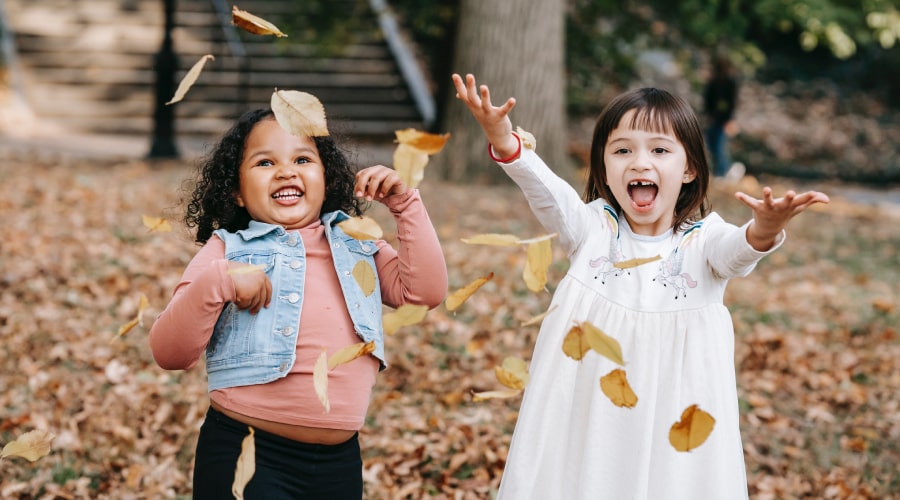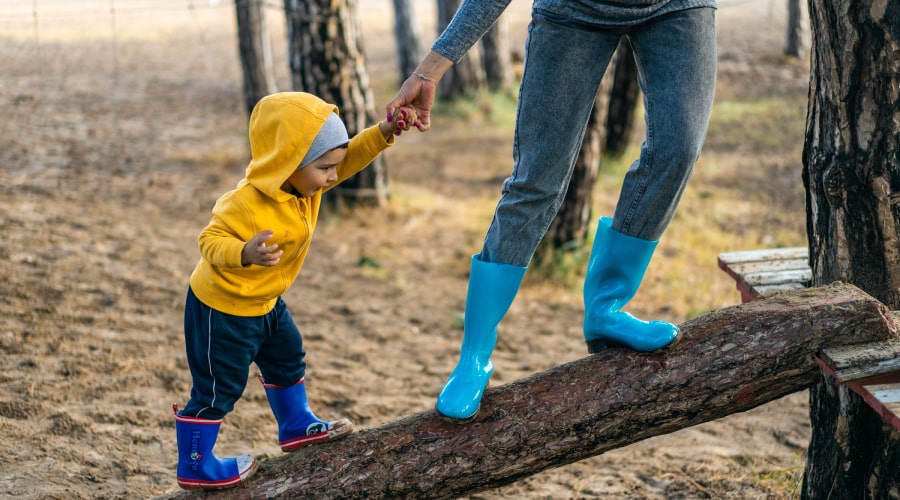settings
children
With Famly since
It began with 650 nominations. Now – there’s just one.
After weeks of reading and debating we’re absolutely thrilled that Helena Meineck of All Saints Pre-School in Exmouth is our Children’s Champion 2020. She completely wowed the judges amongst the nine other finalists, and we’re itching to tell you her story.
From her one secret ingredient to outstanding Early Years teaching (more on that later) to her culturally inclusive environment, Helena has just the kind of Early Years magic that we know so many of you have at your fingertips. The perfect ambassador for a wonderful Early Years sector.
Read on to meet Helena, hear about her journey into the Early Years, her ethos, and what changes she’d like to see for our sector. A perfect example of the kind of tireless work so many of you do every day, I hope you’ll find a few ideas and a little inspiration, and most importantly, just a little wide-eyed grin about a pretty special person indeed.

The very first little one…
“If I’m being honest, it’s all down to my son. If it hadn’t been for him, I would have never gone into Early Years teaching,” Helena told me, when I rang her up a few days after she’d been voted our Children’s champ.
A mum for the first time at 43, Helena was absolutely fascinated with everything her son did. “One day we were walking along the road, and he pointed up and shouted ‘Look mummy, the moon!’ We talked about how the moon comes out at night, and then, two minutes later… ‘Look mummy – it’s another moon!’,” she laughs.
It was in a different place, he’d thought. It couldn’t possibly be the same moon.This small moment caused her to fall in love with nurturing little minds, and she wanted to help them explore that wonderful and exciting world they’ve just been dropped into.
Helena’s ethos
Quite a few years on from that night, Helena now has an honours degree and a PGCE, and understands the immense value of different pedagogical techniques. But she knows there’s a difference between book learning and nurturing children.
“You can have all the books and all the research in the world, but that doesn’t automatically make you a good practitioner,” says Helena. “No child fits those books exactly. You can pull snippets out, of course! But every single child is different, and you’ll need to use a whole host of different theories for every child in your care.”
Having the right tools in your toolkit matters, but for Helena, it’s placing the individual child at the heart of your approach that’s absolutely key. “Keep those books and that research as your foundation. It’s a bit like building a house, when you think about it. You need a strong foundation, but then you need to design it and build it from the ground up. So build it around the children you’ve got.” And this is exactly what she and her staff, Mrs B, Monika and Bozena aim to do.
For them, it’s not about moulding the child around the practice and achievement goals, but moulding the practice around the child.
The secret ingredient
The overarching approach is as simple as can be: listen to the children. Keeping things simple is Helena’s philosophy, and it all boils down to one secret ingredient – happiness. “Having happy children is the key’, says Helena. ‘When they’re happy, they’ll learn anything!”
If we take a look at this simplicity in action – it’s Helena’s smiles: “I always keep a smile in my pocket.” she says. Whenever a child isn’t having a good day, or seems a bit down, she asks if they’d like to borrow her smile. “It always works – and within a few seconds I can see their little faces light up as I root around in my pockets for my spare smile.”
This approach makes All Saints somewhere that children can concentrate on simply being happy. “I want the children to feel as if they’re at a home away from home,” says Helena. If the children feel included, relaxed and happy, then Helena is content.

A multicultural approach
Having spent 20 years of her life in Italy, Helena knows first-hand what it’s like to land in an unfamiliar country, without the language and without a support network. So when she entered the Early Years sector, Helena made creating a welcoming, multicultural community her top priority.
The 14 children who attend her setting come from a variety of different backgrounds, often without any English, and two of her staff members are Polish.
It’s confusing and scary moving to a new country as a child, and being thrown into a room full of children speaking an unfamiliar language can be traumatic. That’s why she embeds multiculturalism at the heart of her practice.
“The key Is not to put children into a category, or stick to one theory or idea. That would be disastrous. It’s about instinct and opening up your heart to that child to make sure you really understand them.” says Helena.
Helena shared a few of the ways she brings the individual child and their unique culture to the heart of her work at All Saints:
- A big smile, talking quietly, lots of gestures, and making sure you’re talking to the child at their level all play a huge role in helping them settle in.
- Helena encourages parents to stay as long as they’d like – both to make them and the child feel comfortable, and lets Helena and her staff observe how they interact with their parents.
- Food plays a big part in making children from other cultures feel at home. Helena finds out a child’s favourite and makes sure it’s available at lunch time. She has several children of Asian heritage at the moment, and ensures she has rice and noodles as a side instead of potatoes – so it’s familiar to them.
- If there are any tools or utensils specific to a culture, like chopsticks, she makes sure to have these too. The little things.
- Praise is a great way to get them smiling and reassure them. Happy smiles, high fives and praise help boost children’s self-esteem and helps them relax. Even if they don’t have the words, they’ll start enjoying themselves and want to come to the setting – and that’s what matters most.
- But the big secret to helping them settle in? It’s the other children. They take great pride in welcoming new children and giving them help when they understand that the child doesn’t speak English. At All Saints, children often learn little snippets of the child’s native language to make them feel comfortable.
Not only that, but Helena recognises that the families themselves have difficulties in integrating into a brand new culture and community. Two of Helena’s staff actually started off as parents who were there to lend a hand, and now they’re an integral part of the team.
The inclusivity that Helena embeds in her work stretches beyond the children – it brings the wider community right to the setting and makes parents a part of the All Saints family.

Powering through the pandemic
Along with ramping up the cleaning, managing drop offs at a distance and following government guidelines, Helena’s found a way to create some lemonade out of this year’s neverending basket of lemons.
“We were already rigorous with our cleaning, as we have a child with cystic fibrosis so we had that down to a T. But right after we went into lockdown, I immediately started making a plan on how we could reopen.’ says Helena. “I knew how much the children needed to get back.”
“We have a huge hall to use, and a massive outdoor space where the children can play safely in the fresh air. They couldn’t go to the beach or the parks – they were so closed off from the rest of the world. We had the chance to give them a little dose of normality at All Saints, and that’s exactly what we focused on when we were allowed to open.”
But more than giving children their routine back, the pandemic actually led to positive change. “I always try to see the positive in absolutely everything, and the pandemic was no different.” says Helena. All Saints is a term-time pre-school, but, as the children had been stuck at home for so long, decided to open her doors over the summer break. “It was such a success, that we’re hoping to do it every summer,” Helena laughs.
“Seeing the pressure it took off parents, and giving them the option of dropping off their children to a safe environment during the summer was just wonderful. The children are an absolute tonic for me, and the benefits of staying open are too good to take away again.”
A much-needed change
The Children’s Champion Award is all about raising awareness for the work practitioners do that so often goes unnoticed, and to highlight how much you’re an undervalued and underpaid part of the education sector. We asked Helena what she’d like to see change.
“If we get it wrong, there’s a possibility that you can ruin a child’s life,” says Helena. Those first few years are the most crucial for letting neural connections form in the brain, and Early Years practitioners are a key part of that.
“That’s one thing that the government still doesn’t understand – how much the Early Years matters in helping children thrive in later life,” states Helena. It can be a make or break situation, and a healthy, happy environment lays the foundations for emotional, social and intellectual development. And creating a bridge between the setting and the school is key.
“Schools need to listen to the Early Years more, because we know the children. We know the children better than they do, and have that close connection with families,” says Helena sincerely.
“And not just that – going to school and starting all over again is traumatic,’ Helena states. “They need a smooth transition so that they can continue the work they’ve been building on in settings. There would be far less children with additional needs later on in life if they could continue from where they left off in the Early Years – we need to have that dialogue with the teachers to ease children into that big, scary new world of primary school.”
We created this award to shine a light on the Early Years sector and the enormous efforts you’ve gone to, not only to keep children safe over the last year, but the work you do every year to shape little minds and give them essential care that sets them up for later life. We’ll see you in 2022!
The big ideas
Get a personal demo now
Get a guided 1-on-1 tour of the whole platform. See what features are the best fit for you, and ask us as many questions as you like.
Book free demo










